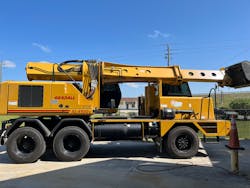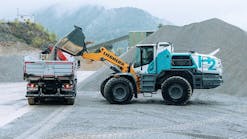Like many fleet managers, Manatee County Florida’s Matt Case, CEM, keeps up with the latest on electric vehicles and other new technologies. The 2023 Fleet Masters gives it a lot of thought, but he’s not the type to jump in quickly.
“I like new technology, but I am a very conservative fleet manager,” Case says.
The county has its first five Ford F-150 Lightnings on order.
“We had a very good opportunity—a company canceled the order, and the vendor came to us and asked us about them as we were doing our replacement cycle—and I said, ‘Yes, we’ll take them.’
Read also: Manatee County wins with planning
“We’re very excited,” Case says. “I’m going to drive one; I’m going to take the first one and drive it and do a networking event around the county, do some ride-and-drives.”
Previously, the county has had hybrids and a couple of Chevy Volt automobiles. “People didn’t like them,” Case says. “It’s going to take a lot of education and training. But specifically for administrative vehicles in our organization, they’re going to be very successful.”
Case also says that the culture in the Southeastern U.S. has been slow and unaccommodating to the move to electric vehicles. In addition, he sees a problem with EV pricing.
“One thing I see now is that they’re very stylish, and manufacturers are using that to their advantage” he says. “I think they’re price gouging. I think they’re way overpriced. That equipment does not cost that much to produce.
“Compared to an internal combustion engine vehicle, they’re very simple, very easy to build,” Case says. “We’ve found that because it is very stylish right now, the costs are high. We’re also seeing that because the Northeast, and especially the west coast, are mandating it. So, the manufacturers are naming the prices, and on the government side, they’re paying it because it’s a mandate and they have to have it.”
Case doesn’t see an EV mandate coming to his area, but he’s committed to cascading them into the fleet.
As for yellow iron, he’s looking for more options from manufacturers first. The numbers will also be crucial.
“For our next batch of dozers that come due for our landfill replacements, we are going to take a look at available options,” Case says. “We may do some refurbs on some Cat D8s we have out there, we may look at what available drivetrain options or drivetrain changes we can do.
“We’ll also see if there’s any grant funding available, and sometimes there is, but right now [for electric machines] there has got to be more options,” he says. “And we also need the longevity or the runtime of the equipment to meet or exceed the fuel burn that the current units have. They must have that—if not, the mentality is going to be no one’s going to want them.”
He likes what he’s seen so far.
“We’re seeing some cool stuff. Case has some neat electric backhoe loaders out. Cat has been very conservative; they are a conservative company and we’re watching them. Same with John Deere,” Case says.
“I think [the OEMs] want to do it right and I like the way they’re doing it, because if they sell something we’re not going to like, it’s going to spoil the soup. We’re not going to buy them.”
Case is intrigued by the maintenance possibilities.
Read also: Renewable diesel holds promise for fleet sustainability
“The other thing is reduced maintenance, there’s not much to them. Yes, they have increased costs. Yes, they don’t use fuel, but we’ve got to get a number on the power it’s going to take,” Case says.
“We have an infrastructure issue here, to support the charging. The other thing we have to look at here is that I can’t go full EV, because we had a near Category 5 hurricane direct hit earlier this year. We had areas of the county without power for weeks.
“If I go full EV, then I also have to invest in infrastructure in power generation for the buildings. Because we have to work. When everybody is hunkering down or everybody is hauling ass out of state, we work.”






